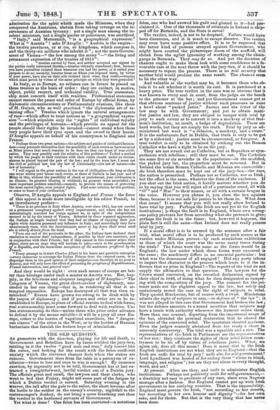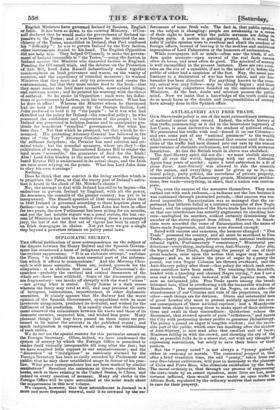THE OLD QUESTION.
As gamesters with the dice-box, playing for life and death, so Government and Rebellion have by turns wielded the jury-box, rattling in it the twelve "good men and true," duly loaded like the cults, and looking for the result with the fierce confident anxiety which the cleverest sharper feels when the stakes are ruinous. Government rises from the table in a paroxysm of ex- ultation—twice to lose and once to win is enough I By immense exertion, by ingenuity not to be told, Government has at last ex- tracted a straightforward, lawful verdict out of a Dublin jury. The officials great and small, the lawyers and their clerks, who went to bed that Friday, might tell some part of the fatigue by
i which a Dublin verdict is earned. Saturday evening to the weaver, the lull after the gale to the sailor, the abort bivouac after the battle to the soldier in the enemy's country, nightfall to the costerinonger's donkey, do not bring a more breathing rest than the verdict to the barrassed servants of Government.
Yet what is done ? One felon has been convicted—a notorious felon, one who had avowed his guilt and gloried in it—had pro- claimed it. One of the thousands of criminals in Ireland is ships ped off for Bermuda, and the State is saved!
The verdict, indeed, is not to be despised. Failure would have been disastrous, and it is much to escape disaster. The verdict may even have some positive effect. It is to be supposed that the better kind of persona arrayed against Government, who might have courted the picturesque doom of the scaffold, will shrink from the uglier ignominy of working among the chain- gangs in Bermuda. They may do so. And yet the doctrine of chances ought to make them look with some confidence to a fa- vourable cast at the next throw with the jury-box, if it should be i necessary to repeat the process. There is no real security that another trial would produce the same result. The chances seem to lie the other way. And valuable as the verdict may be, it becomes those who ob- tain it to ask whether it is worth its cost. It is purchased at a heavy price. The true verdict in the case was so obvious that it was known to every soul in court, from the judge on the bench to the prisoner at the bar ; and yet Government cannot get at that obvious sentence of justice without such processes as raise a howl about " packed juries." Justice and the letter of the law may be with Government ; and yet to obtain mani- fest justice and law, they are obliged to tamper with trial by jury to such extent as to convert it into a mockery of that free- man's institution, an insult, a badge of degradation. These are hard words, but they are simply the truth. Trial by jury as ad- ministered last week is " a delusion, a mockery, and a snare." It is the unfortunate fact in Dublin, that truth is only to be got at by a aidewind : justice must be circumvented, or foregone. A true verdict is only to be obtained by striking out the Roman Catholics who have a right to be on the jury. They are not struck out as Catholics, but as Repealers or sym- pathizers with rebellion ; still they must be out. The Catholics are some five or six sevenths in the population—in the modified, the picked jury list, the proportion must be reversed. But in Ireland the terms Roman Catholic and Milesian are convertible : the Irish therefore must be kept out of the jury-box—the race, the nation is proscribed. Perhaps not as Catholics, nor as Irish; but the effect is the same, whatever the form of the exclusion. If you shut out the Irish nation, it hardly matters whether you do so by saying that you will reject all of a particular creed, all with "O'" and "Mac' to their names, or all with a certain brogue in the voice. However you phrase it, you close the box against them, because it is not safe for justice to let them in. What does that mean? It means that you will not really allow Ireland to have trial by jury. Perhaps the Irish are not yet fit for English institutions ; perhaps the fault is in England, whose own wrong- ous policy prevents her from according what she pretends to give; perhaps the fault is in the times : but, however it happens, the plain fact is still the same—that Ireland does not really possess trial by jury. If a moral effect is to be secured by the sentence after a fair trial, what moral effect is to be produced by such scenes as the verdict under Milesian protest—by such scandalous exhibitions as those of which the court was the scene many times during the trials ? The forms were the same as the forms would be in England ; the law under which those forms were executed is the same ; the machinery differs in no essential particular : but what was the demeanour of all engaged ? Did any party labour to impart that character to the process which lends to it the in- fluence that we prize in England I—The reports of the trial do not supply the affirmative to that question. The lawyers for the Crown stand convicted, on the recorded declaration signed by their chief in 1t346, of doing what he then designated as tamper- ing with the composition of the jury. The counsel for the pri- soner made not the slightest appeal to the law, but solely and audaciously rested the case on the right of subjects to rebel. They quoted Blackstone, but of course with a twist. Blackstone admits the right of subjects to arm,—in defence of " the law ": it was not alleged in this case that Government had broken the law ; but the defence amounts to a round assertion that subjects may have a tussle with authority whenever the humour seizes them. More than one counsel, departing from the impersonal usage of the bar, obtruded the personal declaration that he shared the opinions of the convicted rebel. The spectators shouted applause. Even the judges scarcely abstained from too ready a share in unseemly controversy. The trial was a squabble and a riot. The representatives of the Irish in Parliament are the representatives of her riot : they vindicate the rights of their rebel fellow coun- trymen to be let off by virtue of rebellious juries. What, we again ask, does all this mean? Does it mean that to the Irish English institutions are not what they are to England—that the Irish are unfit for trial by jury? unfit also for self-government? Lord Lyndhurst was hooted at for calling them "aliens in blood, language, and religion"; but are they not aliens in every thought, word, and act At present. Alien are they, and unfit to administer English institutions. Perhaps not positively unfit for self-government,— a disability not easy to predicate of any race, since even Negroes manage after a fashion. But England cannot put up with Irish government in her outlying. counties. That is the impossibility. England must govern the Irish, "not according to her deserts, but according to her own honour and dignity "—for her own sake, and for theirs. But that is the very thing that has never been done. English Ministers have governed Ireland by factions, English or Irish. It has been so down to the existing Ministry. O'Con- nell declared that he would make the government of Ireland im- peesible to the Tories ; and it was because he inherited the ma- rlsinexy of the Tories, unmodified in. Ireland, that Peel confessed his " difficulty " : he was to govern Ireland by the Tory faction, other instruments denied to his hand. The English Opposition did not help him. They helped O'Connell, to make the govern- ment of Ireland impossible to the Tories ,"—using —using the faction in Ireland against the Minister who discarded faction in England. Pending the O'Connell trials, and the debates on the Protection of Life Bill, Lord John Russell industriously raked together commonplaces on Irish grievances and wants, on the vanity of coercion, and the expediency of remedial measures ; he warned Ministers that they must not only try prisoners and coerce the contumacious, but that they must secure food to the Irish—that they must render the land more accessible, must extend tillage, and cultivate wastes; and he pointed his warning with the threat of outbreak. So he spoke in. Opposition : such were his defini- tions of government by faction, such his vaticinations. What has he done in office? Whereas the Minister whom he threatened had no hold of Ireland except by the Orange faction, Lord John professed to hold it by "the people" : he it was who had sketched out the policy for Ireland—the remedial policy ; he who possessed the confidence and cooperation of the people ; to him Ireland was prostrated in helpless famine and in anticipative gra- titude for beneficent "remedial" government. But what has been done ? Not that which he promised, but that which he de- nounced. His protesting Attorney-General has followed in the steps of " the Tory " Attorney-General—carefully treading in the selfsame footprints; the Premier has used coercion and cri- minal trials - but the remedial measures, where are they 2—the cultivation of wastes, the Encumbered istates Bill to render the land more "accessible," the guarantee of food for the Irish? Alas I Lord John blushes at the mention of wastes, the Encum- bered Estates Bill is undiscussed in its actual shape, and the Irish are once more relying on the potato. What has Lord John done to obey his own warnings?
Nothing.
Does he think that one convict is the living sacrifice which is to propitiate the Fates, or that the merry peal of Ireland's salva- tion 18 heard in the clank of Mr. Mitchel's chains ?
No; the attempt to deal with Ireland has still to be begun—the endeavour to govern Ireland by England, with all the power, the,resources, the councils of the greater country, has yet to be inaugurated. The Russell speeches of 1846 remain to show that in 1848 Ireland is governed according to those hopeless plans of faction—not a step made beyond. Lord John has been in office for two years, the new Parliament has been sitting for six months, and yet the last notable statute was a penal statute, the last suc- cess of Ministers has been the verdict wrung from a prearranged jury, the last if not the first act of vigour has been to carry off an; Irish demagogue in chains. Not yet have we got a single step. beyond. a powerless reliance on paltry penal laws.



























 Previous page
Previous page